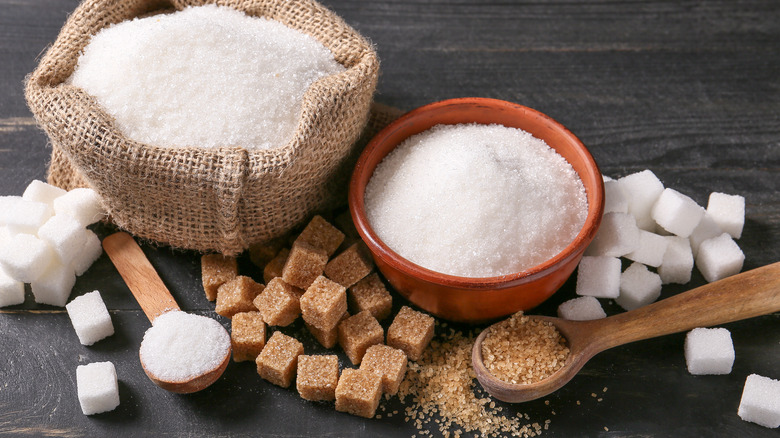How To Start A Sugar Detox
Sugar has had an interesting villain origin story, and it began in the 20th century. It was around that time that cereals, sodas and candy became mainstays in the American diet and the consumption of added sugar skyrocketed, per The Week. Corporations also increased profits by launching campaigns that positioned sugar as a healthy food. Per Business Insider, one ad from the 1970s asked the question, "If sugar is so fattening, how come so many kids are thin?" while another one, this time from the 1950s, claimed, "Sugar is a vital factor in a healthy diet."
However, scientists soon uncovered the harmful effects of sugar on the human body. Too much sugar can lead to diabetes, insulin resistance, heart disease and obesity, notes Medical News Today. Dr. Susan Blum told Well + Good that sugar is also extremely inflammatory, leading to chronic problems and unwanted side effects. Now, the government recommends about 13 teaspoons of sugar per day — but the reality is that we consume nearly 43 teaspoons a day!
Consequently, many are turning to detoxes to help flush out the sugar in their bodies. According to Dr. Blum, a three-day sugar detox might be the best option for a beginner. A detox can help you feel less tired, moody while allowing you to reassess your relationship with sugar. If you're someone who begins their day with sugar in your coffee and ends it with a nightcap, read on to know how to complete a sugar detox.
When detoxing, remember that sugar withdrawal is a real thing
In a sugar detox, you cut out obvious sources of added sugar like soda, alcohol, juices, and desserts. While there's no clear rule for everyone, Dr. Susan Blum told Well + Good that keeping your sugar intake below 15 grams would be a good start. But what about going cold turkey? Dietitian Brooke Alpert told CNN that "once you take sugar away from your diet [all at once], your palate recalibrates, and, [in a few days], you start tasting natural sugars again." But beware of sugar withdrawal! "Sugar is a substance that has been shown to release dopamine and opioids in the brain, both of which have addictive potential," Dr. Ilene Ruhoy told Insider. This means that it may take a few days for your body to adjust to the decrease in sugar.
To ease yourself into it, allow yourself some sugar — but cut out other sources. Insider also recommends eating more protein and healthy fats, as they can keep you fuller for longer and can reduce cravings. Dehydration is also a major influencer in increasing sugar cravings, so make sure you're keeping your Brita close by. But if the cravings take over (as they usually do), stock up on fruit and natural sources of sugar to keep you going. The long-term benefits of occasional sugar detoxes are definitely worth foregoing a few cans of soda.

